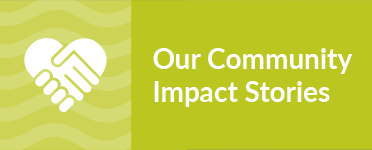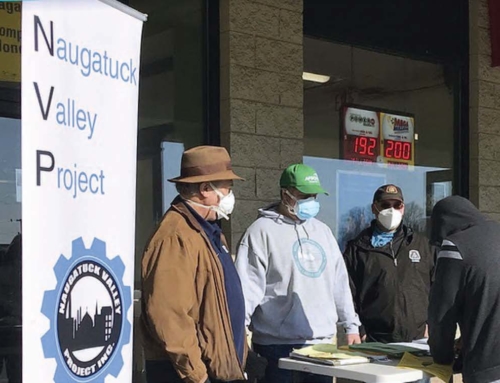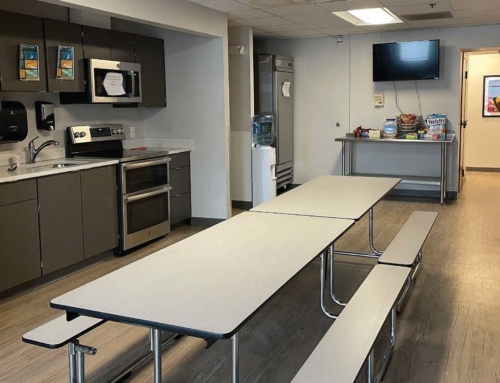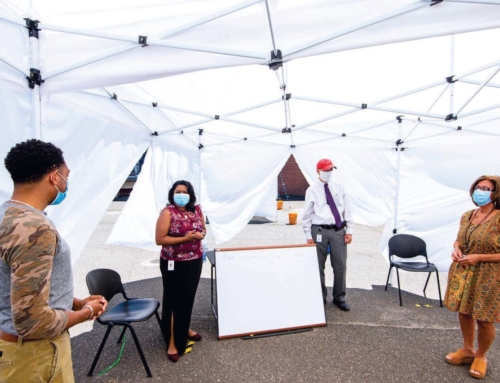
As soon as the COVID-19 pandemic hit, nonprofit organizations shifted into high gear, adapting to meet the needs of the people they serve in a landscape that had changed overnight. For some, that meant improvising ways to move work online and stay connected to those who depended on them. But for many others it meant continuing to work in person, often with some of the population’s most vulnerable to the virus. Doing this work safely meant securing large and consistent quantities of personal protective equipment (PPE), such as face masks, face shields, and gloves.
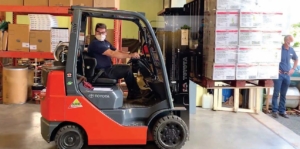
A fork lift operator at Marion Manufacturing assisted throughout the distribution effort to move pallets of gloves, masks, and face shields.
In the early months of the pandemic, state stockpiles were insufficient and only met a fraction of the demand, and simply did not reach many organizations. Nonprofits had no choice but to turn to retail sources, where PPE was extremely costly, if it could be found at all. Many organizations were spending thousands of dollars on PPE and cleaning supplies at a time when revenues were dropping due to suspended income-generating services and canceled fundraisers.
Organizations quickly began turning to the COVID-19 Response Fund for help in meeting these unbudgeted costs. Spotting the trend, Connecticut Community Foundation and United Way of Greater Waterbury—who administered the Fund together—surveyed local nonprofits and found that 73 percent had staff members at high risk of contracting COVID-19, 81 percent served high-risk clients, and 81 percent indicated they were not receiving assistance from the State of Connecticut to source and buy the PPE they needed to keep their employees and clients safe from the virus.
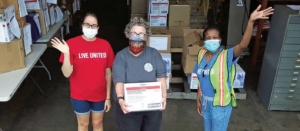
Jessica Carlino, volunteer engagement coordinator, United Way of Greater Waterbury, Robin Tiede, volunteer, and Renee Young, community impact manager, United Way of Greater Waterbury, help with PPE distribution.
Thinking there had to be a more efficient and cost-effective solution than funding dozens of individual grants for small quantities of PPE purchased at top dollar from online sellers and local retail stores, we went in search of a wholesale supplier. We were fortunate to connect with Grace Farms Foundation, based in New Canaan, Connecticut, which had already pivoted from its own mission and established a stable supply chain for quality PPE, which it was distributing to health care workers, first responders, and essential workers throughout the state to meet some of the gap between supply and demand in the early months of the pandemic.
With a grant of $95,000 from the COVID-19 Response Fund, in partnership with Grace Farms, we were able to purchase more than 400,000 pieces of PPE. With an enormous shipment on the way from out of state, we were grateful to partner with Cheshire-based Marion Manufacturing, which not only opened its warehouse to us to receive the PPE, but also lent its logistics expertise, forklift drivers, staff volunteers, loading dock, and everything else we needed to stage a two-day distribution. 109 organizations benefited with an eight-week supply of gloves and a 12-week supply of masks, according to their individual needs. “It was our chance to give back to the community,” said Doug Johnson, president of Marion Manufacturing and a Connecticut Community Foundation trustee.
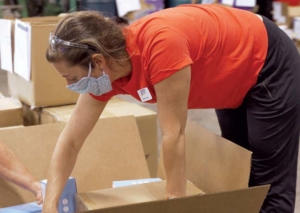
Ellen Carter, vice president of program and strategy at Connecticut Community Foundation, organizing boxes of PPE for nonprofits to pick up.
Thanks to all who had contributed to the COVID-19 Response Fund, nonprofits that received PPE through this distribution were able to continue their work while keeping people safe. As Kim Selvaggi, chief strategy officer of Community Solutions, Inc., put it with regard to the teens her organization serves, “Our kids and clients mean the world to us, so being able to care for them in a safe and responsible way is everything.”


